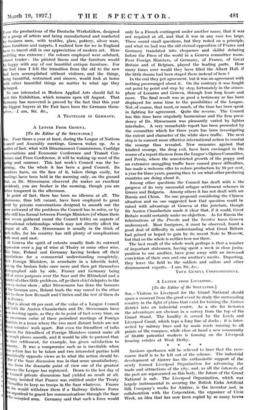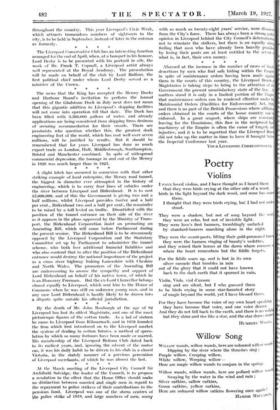A LETTER FROM LIVERPOOL.
[To the Editor of the SPECTATOR.] SIR,—Visitors to Liverpool for the Grand National should spare a moment from the great event to study the surrounding country in the light of plans that exist for turning the Aintree district into an industrial centre. As a site for factories the advantages are obvious in a survey from the top of the Grand Stand. The locality is served by the Leeds and Liverpool Canal, which taps a long line of docks ; it is inter- sected by railway lines and by main roads running to all points of the compass, while close at hand a new community of '50,000 potential workers is forming on the Liverpool housing estates at West Derby.
Anxious sportsmen will be relieved to hear that the race- course itself is to be left out of the scheme. The industrial development of Aintree has the enthusiastic support of the newly formed Liverpool Organization for advancing the trade and attractions of the city, and, as all the interests of the port are represented on this body, the future of the Grand National is safe. The Liverpool Organization, which was largely instrumental in securing the British Enka Artificial Silk Company's works for Aintree, is the inventor and, in collaboration with the Corporation, the organizer of Civic Week, an idea that has now been copied by so many towns
throughout the country. This year Liverpool's Civic Week, which attracts tremendous numbers of sightseers to the city, is to be held in September, instead of later in the autumn as formerly. * * * The Liverpool Conservative Club has an interesting function arranged for the end of April, when, at a banquet in his honour, Lord Derby is to be presented with his portrait in oils, the work of Mr. Frank T. Copnall; a Liverpool artist always well represented at the Royal Academy. The presentation will be made on behalf of the club by Lord Balfour, the first political chief under whom Lord Derby served as a minister of the Crown.
The news that the King has accepted the Mersey Docks and Harbour Board's invitation to perform the formal opening of the Gladstone Dock in July next does not mean that this gigantic addition to Liverpool's shipping facilities will not come into operation till that date. The Dock has been filled with 3,500,000 gallons of water, and already applications are being considered from shipping firms desirous of securing accommodation for their vessels. There are pessimists who question whether this, the greatest dock engineering feat of the world, which has cost well over seven millions, will be justified by results. But it should be remembered that for years Liverpool has done as much export trade as London, Hull, Middlesbrough, Southampton, Bristol and Manchester combined. In spite of widespread commercial depression, the tonnage in and out of the Mersey in 1926 was much larger than in 1925. * * A slight hitch has occurred in connexion with that other striking example of local enterprise, the Mersey road tunnel, the biggest in diameter ever attempted in the history of engineering, which is to carry four lines of vehicles under the river between Liverpool and Birkenhead. It is to cost £5,000,000, and of this the Government is giving two and a half millions, whilst Liverpool provides twelve and a half per cent, Birkenhead two and a half per cent., the remainder to be raised by a toll levied on traffic. Dissatisfied with the position of the tunnel entrance on their side of the river as it appears in the plans approved by the Ministry of Trans- port, the Birkenhead Corporation insist on promoting an Amending Bill, which will came before Parliament during the present session. The Birkenhead Bill is to be strenuously opposed by the Liverpool Corporation and the Statutory Committee set up by Parliament to administer the tunnel scheme, who both fear additional financial liabilities and who also contend that to alter the position of the Birkenhead entrance would destroy the national importance of the project as a cross river highway linking Lancashire with Cheshire and North Wales. The promoters of the Amending Bill are endeavouring to arouse the sympathy' and support of Lord Birkenhead on behalf of his native town, of which he is an Honorary Freeman. But the ex-Lord Chancellor belongs almost equally to Liverpool, which sent him to the House of Commons when he was still an unknown young man, and in any case Lord Birkenhead is hardly likely to be drawn into a dispute quite outside his official jurisdiction. * *
By the death of Mr. John Roxburgh at the age of 92 Liverpool has lost its oldest Magistrate, and one of the most picturesque figures of the cotton trade. As a lad of sixteen he came to Liverpool from Kilmarnock, and in 1870 founded the firm which first introduced on to the Liverpool market the system of dealing in cotton futures, a method of specu- lation by which so many fortunes have been made or marted. His membership of the Liverpool Reform Club dated back to its earliest years, and, ignoring the advent of the motor car, it was his daily habit to be driven to his-club in a closed Victoria, in the stately manner of a previous generation
of Liverpool merchants; of which he was almost the last.
* • * *
At the March meeting of the Liverpool City Council Sir Archibald Salvidge, the leader of the Council, is to propose a resolution to the effect that the Home. Office should make no distinction between married and single men in regard to the repayment to police strikers of their contributions to -.the pensions fund. Liverpool was one of the storm centres. of the police strike of 1916, and large numbers of men, many
. with as much as twenty-eight years' service, were dismis from the City's force. There has always been a strong pu opinion in Liverpool behind the City Council's determinar not to reinstate the strikers, but there is an equally strn feeling that men who have _already been heavily punisl by losing their posts are at least entitled to the return what is, in fact, their own money.
* *
Alarmed at the increase in the number of cases of frun deSertions by men who find safe hiding within the Empire in spite of maintenance orders having been made agai them in the courts of this country, the Liverpool Bends Magistrates is taking steps to bring to the attention of t Government the present unsatisfactory state of the law. A matters stand it is only in a limited portion of the Empi that maintenance orders can be rendered effective under t Matrimonial Orders (Facilities for Enforcement) Act, two and there is no part of the British Possessions where aiTiliatio orders obtained in the courts of the home country can I enforced. In a great seaport, where ships are constant leaving for the Dominions, this flaw in the reciprocal I machinery of the Empire is often the cause of tragedy a injustice, and it is to be regretted that the Liverpool Box did not take up. the matter in time to have it brought heft the Imperial Conference last year.
YOUR LIVERPOOL. CORRESPONDENT.































































 Previous page
Previous page